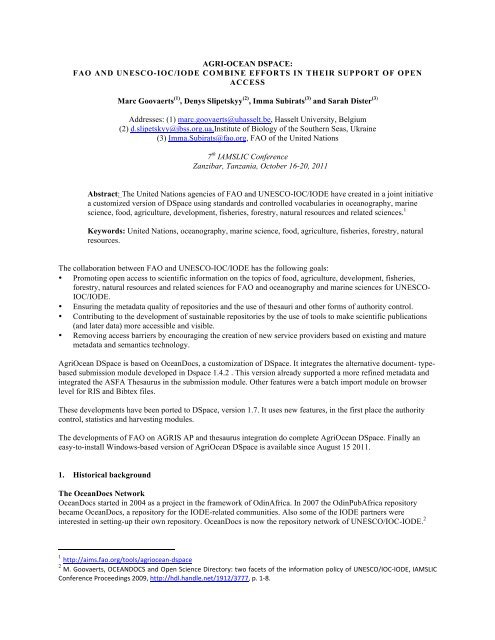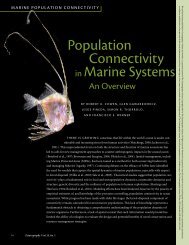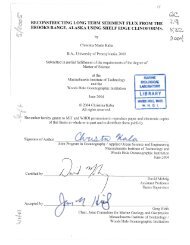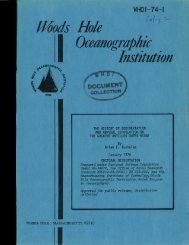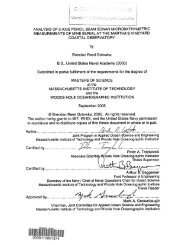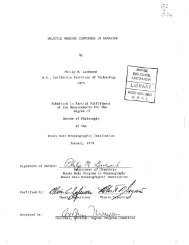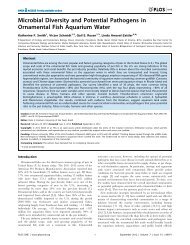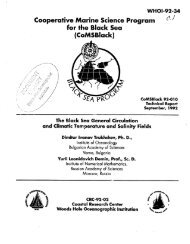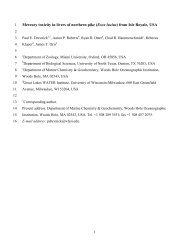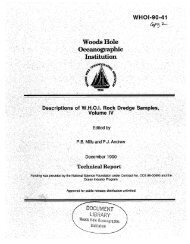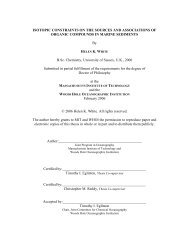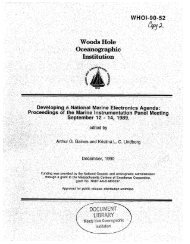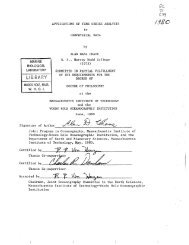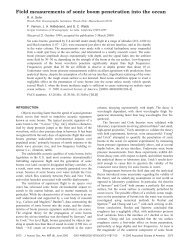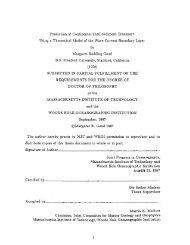AGRI-OCEAN DSPACE: FAO AND UNESCO-IOC/IODE COMBINE ...
AGRI-OCEAN DSPACE: FAO AND UNESCO-IOC/IODE COMBINE ...
AGRI-OCEAN DSPACE: FAO AND UNESCO-IOC/IODE COMBINE ...
Create successful ePaper yourself
Turn your PDF publications into a flip-book with our unique Google optimized e-Paper software.
<strong>AGRI</strong>-<strong>OCEAN</strong> <strong>DSPACE</strong>:<br />
<strong>FAO</strong> <strong>AND</strong> <strong>UNESCO</strong>-<strong>IOC</strong>/<strong>IODE</strong> <strong>COMBINE</strong> EFFORTS IN THEIR SUPPORT OF OPEN<br />
ACCESS<br />
Marc Goovaerts (1) , Denys Slipetskyy (2) , Imma Subirats (3) and Sarah Dister (3)<br />
Addresses: (1) marc.goovaerts@uhasselt.be, Hasselt University, Belgium<br />
(2) d.slipetskyy@ibss.org.ua,Institute of Biology of the Southern Seas, Ukraine<br />
(3) Imma.Subirats@fao.org, <strong>FAO</strong> of the United Nations<br />
7 th IAMSLIC Conference<br />
Zanzibar, Tanzania, October 16-20, 2011<br />
Abstract: The United Nations agencies of <strong>FAO</strong> and <strong>UNESCO</strong>-<strong>IOC</strong>/<strong>IODE</strong> have created in a joint initiative<br />
a customized version of DSpace using standards and controlled vocabularies in oceanography, marine<br />
science, food, agriculture, development, fisheries, forestry, natural resources and related sciences. 1<br />
Keywords: United Nations, oceanography, marine science, food, agriculture, fisheries, forestry, natural<br />
resources.<br />
The collaboration between <strong>FAO</strong> and <strong>UNESCO</strong>-<strong>IOC</strong>/<strong>IODE</strong> has the following goals:<br />
• Promoting open access to scientific information on the topics of food, agriculture, development, fisheries,<br />
forestry, natural resources and related sciences for <strong>FAO</strong> and oceanography and marine sciences for <strong>UNESCO</strong>-<br />
<strong>IOC</strong>/<strong>IODE</strong>.<br />
• Ensuring the metadata quality of repositories and the use of thesauri and other forms of authority control.<br />
• Contributing to the development of sustainable repositories by the use of tools to make scientific publications<br />
(and later data) more accessible and visible.<br />
• Removing access barriers by encouraging the creation of new service providers based on existing and mature<br />
metadata and semantics technology.<br />
AgriOcean DSpace is based on OceanDocs, a customization of DSpace. It integrates the alternative document- typebased<br />
submission module developed in Dspace 1.4.2 . This version already supported a more refined metadata and<br />
integrated the ASFA Thesaurus in the submission module. Other features were a batch import module on browser<br />
level for RIS and Bibtex files.<br />
These developments have been ported to DSpace, version 1.7. It uses new features, in the first place the authority<br />
control, statistics and harvesting modules.<br />
The developments of <strong>FAO</strong> on <strong>AGRI</strong>S AP and thesaurus integration do complete AgriOcean DSpace. Finally an<br />
easy-to-install Windows-based version of AgriOcean DSpace is available since August 15 2011.<br />
1. Historical background<br />
The OceanDocs Network<br />
OceanDocs started in 2004 as a project in the framework of OdinAfrica. In 2007 the OdinPubAfrica repository<br />
became OceanDocs, a repository for the <strong>IODE</strong>-related communities. Also some of the <strong>IODE</strong> partners were<br />
interested in setting-up their own repository. OceanDocs is now the repository network of <strong>UNESCO</strong>/<strong>IOC</strong>-<strong>IODE</strong>. 2<br />
1 http://aims.fao.org/tools/agriocean-‐dspace<br />
2 M. Goovaerts, <strong>OCEAN</strong>DOCS and Open Science Directory: two facets of the information policy of <strong>UNESCO</strong>/<strong>IOC</strong>-‐<strong>IODE</strong>, IAMSLIC<br />
Conference Proceedings 2009, http://hdl.handle.net/1912/3777, p. 1-‐8.
Fig. 1. From OdinPubAfrica to AgriOcean Dspace: Website in evolution (2004-2011).<br />
The OceanDocs Network has now about 50 members. The OceanDocs 3 repository includes more than 40 institutes<br />
from Africa and Latin America (3,654 docs). The new partners GEOHAB (Global Ecology and Oceanography of<br />
Harmful Algal Blooms) and ASCLME (Agulhas and Somali Current Large Marine Ecosystem) will start to submit<br />
their publications in the near future.<br />
The Institute of Biology of the Southern Seas (IBSS – Sevastopol, Ukraine) started their repository in 2007 which is<br />
based on the OceanDocs implementation. Their participation in the software development was critical for the<br />
finalization of AgriOcean Dspace. The collection contains now 1830 documents 4 . IBSS is also responsible for the<br />
CEEMAR repository of OdinECET, containing 964 publications 5 .<br />
ODINPimris and the National Institute of Oceanography(GOA, India) have created their repository using other<br />
software. ODINPimris uses Greenstone, while NIO uses a standard Dspace.<br />
The OceanDocs network is set-up to support ODIN’s (Ocean Data and Information Network) of <strong>IODE</strong> 6 with the<br />
development of repositories and has the following goals:<br />
• Facilitate publishing of research findings by scientists (e-journal as well as e-archive) thereby promoting<br />
the related research and increasing access by scientists to the international research forum, specifically for<br />
oceanography, marine and related sciences<br />
• Make scientific publications in the field of marine science and oceanography more easily and freely<br />
accessible<br />
• Enhance the internal scientific communication<br />
• Use of common standards<br />
3 http://www.oceandocs.net<br />
4 http://repository.ibss.org.ua/dspace<br />
5 http://www.ceemar.org<br />
6 http://www.iode.org
Other projects are now getting linked to OceanDocs. Afrilib, the federated catalogue of OdinAfrica, will use OAIcompatible<br />
software, including AgriOcean Dspace, making it possible to exchange metadata between the local<br />
OdinAfrica partners, the Afrilib catalogue and the OceanDocs repository. The pilot project to archive data sets,<br />
Published Ocean Data, is the result of a cooperation between SCOR, MBLWHOI and <strong>IODE</strong>, and is evaluating the<br />
possibility to use AgriOcean Dspace too.<br />
<strong>FAO</strong> and Dspace:<br />
<strong>FAO</strong> is since 2008 interested in DSpace as a tool for <strong>AGRI</strong>S centres. They were looking for software to share<br />
information in a standardized manner, using more sophisticated and specialized metadata, a common semantics and<br />
interoperable syntaxes. The use of <strong>AGRI</strong>S AP as a metadata standard and the integration of AGROVOC as a<br />
controlled vocabulary were other requirements of <strong>FAO</strong>.<br />
Based on version 1.5, Prof. dr. ARD Prasad of the Indian Statistical Institute (Bangalore, India) created Agris<br />
Dspace for <strong>FAO</strong>. He adapted the submission module to create richer metadata, adding for example the language<br />
option to a field. Agris AP was supported in the OAI-PMH module. 7<br />
Fig. 2. The submission module of Agris Dspace.<br />
Kasetsart University, Bangkok (Thailand) has also developed a plug-in for the use of AGROVOC in Dspace 1.5.2.<br />
This beta-version has not been upgraded to the later versions of Dspace.<br />
Cooperation between <strong>FAO</strong> and <strong>UNESCO</strong>-<strong>IOC</strong>/<strong>IODE</strong><br />
The communities supported by the United Nations agencies <strong>FAO</strong> and <strong>UNESCO</strong>-<strong>IOC</strong>/<strong>IODE</strong> are synergistic (Agris,<br />
ASFA and ODIN) and the standards on metadata (Agris AP) and controlled vocabularies (Agrovoc or ASFA<br />
thesaurus) are similar for both.<br />
A common repository development is a logical result. Hasselt University Library has created for <strong>FAO</strong> and<br />
<strong>UNESCO</strong>-<strong>IOC</strong>/<strong>IODE</strong> a new version called AgriOcean DSpace which is available since 1 August 2011. It integrates<br />
the previous developments of both agencies in one customized version of DSpace.<br />
2. AgriOcean DSpace: the best of both world<br />
Release of AgriOcean DSpace 1.0<br />
AgriOcean DSpace 1.0 was released mid August 2011 and is now available in source code at Google Code 8 with the<br />
option to customize the lay-out and adapt the configuration file to local requirements. For partners with limited IT<br />
support, a Windows-based easy-to-install version is available.<br />
The system is based on a a type-based submission module and includes the possibility to enter more refined<br />
metadata, define the language on field level and use the DSpace authority control system for journals and the ASFA<br />
7 http://www.dspace.org/images/Training_Materials/<strong>AGRI</strong>S%20AP%20add-‐on%20for%20DSpace.pdf<br />
8 http://code.google.com/p/agriocean/
and AGROVOC ontologies. AgriOcean DSpace focuses on Agris AP and MODS (OAI-PMH compliant), which are<br />
the most relevant formats for the communities involved.<br />
Fig. 3: The home page of AgriOcean Dspace.<br />
The Enhanced Submission Module<br />
In Dspace the interface of the submission module has only a limited range of options. These are defined by the<br />
‘initial questions’: Published or not, more than one title and more than one attachment.<br />
From experience, users need a more structured approach. Therefore, OceanDocs already included a type-based<br />
submission module. This module has been refined for AgriOcean Dspace and a new definition table has been<br />
created: input-forms-extended.xml.
<br />
<br />
<br />
<br />
<br />
…<br />
<br />
<br />
<br />
<br />
<br />
<br />
Fig. 4 Definition of type templates in input-forms-extended.xml<br />
In the input-form-extended.xml file the different types are defined (see fig. 4) and for every type a different template<br />
can be created.<br />
Fig. 5 Options in the submit module to select a template by type.
In AgriOcean Dspace, after choosing a collection, you can immediately start describing the document. If you need<br />
another template you can switch by selecting another type. A default type can be defined in the input-formsextended<br />
file. Here it is ‘Journal contribution’.<br />
Fig. 6. Layout options in AgriOcean Dspace.<br />
AgriOcean Dspace has included extra lay-out options compared to standard Dspace: grouping of fields (in a row and<br />
a block), defining field size and adding a language option for a field.<br />
<br />
<br />
….<br />
<br />
<br />
<br />
dc<br />
bibliographicCitation<br />
volume<br />
Volume<br />
onebox<br />
false<br />
<br />
<br />
…<br />
<br />
dc<br />
bibliographicCitation<br />
endpage<br />
End page<br />
onebox<br />
false<br />
<br />
<br />
<br />
<br />
Fig. 7. Layout options defined in input-forms-extended.xml
The authority control of Dspace 1.7 has also been enhanced. The link between field and authority list is now defined<br />
in input-forms-extended (see Fig. 8). This way for every different type template a different authority list could be<br />
defined even on the same Dublin Core element.<br />
issn<br />
Fig. 8. Use of authority control defined in input-forms-extended.xml.<br />
For the journal titles, AgriOcean Dspace uses a table containing 37.000 titles. The ISSN is used as the authority code,<br />
which is also copied to the dc.identifier.issn field. Still it is possible to enter manually a missing title with its ISSN.<br />
Finally, the title, volume, issue, start and end page are kept in the database as separate values, but they are also<br />
concatenated to the dc.identifier.citation element. This has two advantages. AgriOcean Dspace keeps a very refined<br />
metadata, while the formatting of dc.idenfier.citation is standardized.<br />
Fig. 9 Authority control for Journal titles and ISSN.<br />
The authority control system is used for the ASFA and AGROVOC keywords too. This authority control system<br />
gives only the opportunity to search through an alphabetic list of keywords using autosuggestion search options.<br />
Fig. 10 Authority control for ASFA and AGROVOC.
The integration of a thesaurus and ontology system will be based on the work of Kasetsart University on Dspace<br />
1.5.2. It will be integrated in the next version of AgriOcean Dspace.<br />
Finally, the layout and authority control elements developed for the submission module are also used in the Edit<br />
interface of AgriOcean Dspace (See Fig. 11).<br />
Refinement of the OAI-PMH Output in AgriOcean Dspace<br />
Fig. 11. Edit mode of AgriOcean Dspace.<br />
A main goal of AgriOcean Dspace is to create refined metadata and use richer standards like Agris AP and MODS.<br />
The standard metadata format of Dspace is Qualified Dublin Core. Elements and qualifiers can be defined. It is also<br />
possible to create other formats, but because of the internal structure of Dspace, it will always be limited to a two<br />
level approach: element and qualifier. It has the advantage that it is easy to create new elements and qualifiers even<br />
out of the Dublin Core range. This is in not a problem since it is in fact only a wayof structuring internally the<br />
metadata.<br />
The main problem is how this internal structure is translated to the external world. In the first place how the<br />
metadata is exposed through the OAI-PMH protocol. The crosswalk system of Dspace is in that way very efficient,<br />
still it has its limitations (see further).<br />
AgriOcean Dspace starts with very specific metadata fields. Extra elements were created when the the necessary<br />
granularity is missing: e.g. dc.bibliographicCitation.volume, dc.bibliographicCitation.issue,<br />
dc.bibliographicCitation.stpage, dc.bibliographicCitation.endpage. Basic elements like dc.identifier.citation are<br />
recreated through concatenation of these fields.<br />
Through the system of crosswalks the output of Dublin Core and Qualified Dublin Core can easily be managed.<br />
AgriOcean Dspace enhances the crosswalk functionalities to support Agris AP and MODS fully.
Dspace collects values that are not defined in element and qualifier, like the language and the authority ID. These<br />
values could not be translated to a metadata format in the existing OAI-PMH module. Therefore the crosswalk<br />
system was rewritten.<br />
First, It is now possible to define the concatenation of fields (which are not repeatable).<br />
Example in MODS crosswalk:<br />
dc.bibliographicCitation.conferencename = conference%s.<br />
$dc.bibliographicCitation.conferenceplace|s$,<br />
$dc.bibliographicCitation.conferencedate|s$ <br />
Result in OAI-PMH, combining the elements conference name, place and date:<br />
< name type="conference "><br />
conference<br />
< namepart >5 th IAMSLIC Conference. Paris, 25 June 1999<br />
<br />
Figure 12. Concantenation of fields.<br />
Secondly, the values language and authority can now also be translated.<br />
Example in MODS crosswalk:<br />
dc.subject.asfa = %s<br />
Result in OAI-PMH:<br />
<br />
Fish meal<br />
<br />
Figure 13. Translation of values language and authority.
Thirdly, The xml tags are grouped. In Agris AP and MODS, deeper levels of XML are sometimes required.<br />
Therefore subtags are grouped under the tags of the higher level.<br />
Example in <strong>AGRI</strong>S AP crosswalk:<br />
dc.subject.asfa = %s<br />
dc.subject.agrovoc = %s<br />
dc.subject.agrovoc-uri = %s<br />
Result in OAI-PMH:<br />
<br />
Accumulation<br />
Fish meal<br />
Wastes<br />
Water masses<br />
Fish meal<br />
Wastes<br />
http://aims.fao.org/aos/agrovoc/c_2925<br />
http://aims.fao.org/aos/agrovoc/c_8307<br />
<br />
Figure 15. Grouping of xml tags.
But grouping can be turned off. At the end of the translation line the level of ungrouping is defined in Figure 16,<br />
below.<br />
Example in MODS crosswalk:<br />
dc.contributor.author= <br />
author<br />
%s | name<br />
Result in OAI-PMH:<br />
<br />
<br />
author<br />
<br />
Said, T.O.<br />
<br />
<br />
<br />
author<br />
<br />
Hamed, M.A.<br />
<br />
Figure 16. Level of ungrouping.<br />
The combination of granular internal metadata and a refined crosswalk system results in high metadata quality as<br />
can be seen in OceanDocs: For agris at http://www.oceandocs.org/odinoai/request?verb=ListRecords&metadataPrefix=agris&set=hdl_1834_104,<br />
for mods at<br />
http://www.oceandocs.org/odin-oai/request?verb=ListRecords&metadataPrefix=mods&<br />
set=hdl_1834_104.<br />
High quality metadata is not a goal in itself. It makes extra services possible if communities stick to the high quality<br />
metadata, which is proved by projects like VOA3R 9 .<br />
9 http://voa3r.eu/ -‐ http://voa3r.cc.uah.es
Easy-to-install Version.<br />
The Easy-to-install version was created to make AgriOcean Dspace available for smaller organizations with limited<br />
IT support. It is already distributed in OdinAfrica and will be tested in the Agris network.<br />
Fig. 17. The AgriOcean Easy Installer (10 min between both screenshots).<br />
The package contains a builded AgriOcean Dspace and Postgresql. After installing Tomcat users simply have to<br />
define the main configuration elements of Dspace and Postgres during a set up procedure that takes about 15<br />
minutes. The set-up procedure has been thoroughly tested for Windows Vista and 7, while a beta Windows XP<br />
version is also available 10 . The installer is created with the Open Source package ‘SpringSource Tool Suite’.<br />
3. Distribution and Support<br />
AgriOcean Dspace is available at http://code.google.com/p/agriocean/downloads. <strong>FAO</strong> created an AgriOcean<br />
DSpace community on AIMS, Agricultural Information Management Standards:<br />
http://aims.fao.org/community/group/agriocean-dspace<br />
AIMS 11 (Agricultural Information Management Standards) is a web portal managed by <strong>FAO</strong> of the United Nations<br />
that disseminates standards and good practices in information management to support the right to food, sustainable<br />
agriculture and rural development. AIMS supports the implementation of structured and linked information and<br />
knowledge by fostering a community of practice centered on the themes of interoperability, reusability and<br />
10 : http://code.google.com/p/agriocean/downloads/detail?name=1_installation_agriocean-‐dSpace-‐1_0-‐3.pdf<br />
11 http://aims.fao.org/
cooperation. It shares vocabularies, methodologies, tools and services in order to promote coherence in agricultural<br />
information.<br />
On AIMS under ‘Tools’ a special section is dedicated to AgriOcean DSpace 12 containing background information,<br />
support material and the AgriOcean Dspace community pages. The community is set-up for all institutions that<br />
would like to install AgriOcean DSpace or are interested in the repository software. On its forum the AgriOcean<br />
DSpace team provides assistance with installing and using AgriOcean DSpace, answers questions and<br />
communicates new developments and solved bugs.<br />
<strong>UNESCO</strong>-<strong>IOC</strong>/<strong>IODE</strong> will create complementary courses on the OceanTeacher platform 13<br />
12 http://aims.fao.org/tools/agriocean-‐dspace -‐ http://aims.fao.org/community/group/agriocean-‐dspace<br />
13 http://classroom.oceanteacher.org/
4. Future Developments of AgriOcean Dspace.<br />
The batch import functionality will be available at the beginning of December 2011. It will then be possible to<br />
upload metadata files in Agris AP, Endnote and Zotero-RIS format .<br />
Authority control will be extended to author names and the thesaurus/ontology plug-in will make it easier to<br />
manage ASFA, Agrovoc and even geographical descriptors. This will be included in the next release which is<br />
planned for August 2012.Next releases will keep in pace with the Dspace version available at that moment.<br />
AgriOcean Dspace is part of the set of tools to be distributed among the VOA3R data providers for the<br />
implementation of document repositories. The possibilities of Linked Open Data (LOD) for AgriOcean Dspace will<br />
be explored.<br />
OceanDocs and AgriOcean Dspace.<br />
AgriOcean Dspace is already installed on the OceanDocs repository and partners like IBSS (Ukraine), CEEMAR<br />
(Eastern Europe) and KMFRI (Kenya).<br />
Fig. 13. Installations of AgriOcean Dspace.<br />
<strong>IODE</strong> partners will have more options in developing their repository collection. They can still join the OceanDocs<br />
repository, but they can use now the software package available at the AgriOcean Google Code site. Organizations<br />
with limited IT capacity will opt for the Easy-to-install version, while others can use the source code to have a more<br />
customized repository.<br />
The OceanDocs repository will harvest the <strong>IODE</strong>-related repositories. In the future, it will also be possible to harvest<br />
metadata and full text, creating a mirror of the local repositories, which not always have a stable environment.<br />
OceanDocs is already harvested by AVANO and will be by Agris of <strong>FAO</strong>.


